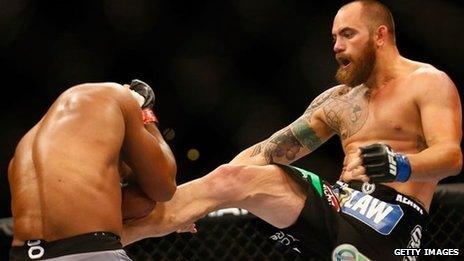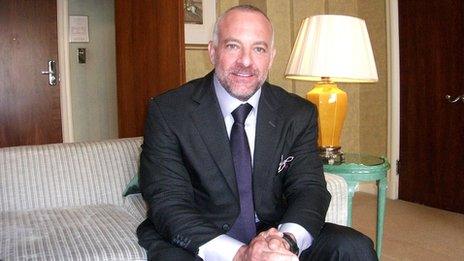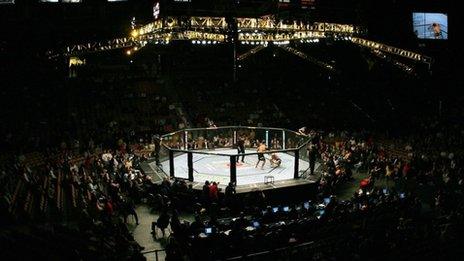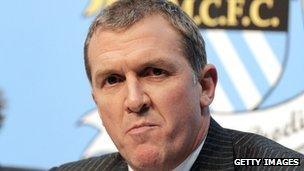UFC fights for growing UK fan base
- Published

UFC fights combine four different Olympic-sanctioned combat sports
The latest in a series of US sporting exports goes under the spotlight in the UK this weekend, looking to build a fan base and television audience away from its spiritual home.
But this is not the latest NFL game at Wembley, rather it is the equally bone-jarring mixed martial arts event in Manchester staged by the UFC, the leading promoter in a sport known in street vernacular as "cage fighting".
Casino owner Lorenzo Fertitta and his brother Frank bought the UFC - the letters stand for Ultimate Fighting Championship - for $2m (£1.24m) back in 2001. Since then its value has soared and it now generates $500m a year in revenues.
From being a sport with a limited TV audience, it is now shown in close to 150 countries, in 28 languages, and broadcast to one billion homes.
But why did the brothers decide to buy into a sport that was on the ropes at the time?
Global appeal
"It was a combination of business sense and love of sport. I thought it had good business potential," says Lorenzo, 44.
He said that coming from Las Vegas, he had seen many great boxing bouts in a city dubbed Fight Town - from Muhammad Ali and Larry Holmes, to the golden era of the late 1970s and early 1980s featuring Sugar Ray Leonard, Marvin Hagler, Thomas Hearns and Roberto Duran, and then into the Mike Tyson era.
"But when I looked at boxing, I felt it was a broken business in many ways, with a short-term vision from a business perspective," Mr Fertitta says.
It is a business that has been around for 100 years, makes millions in revenues, but has no real brand value, he adds.

Mr Fertitta has made the UFC the world's largest mixed martial arts promoter
"Then we came across the UFC and felt there was value in the brand."
He said that the UFC brand had transcended the sport it promotes - mixed martial arts - and that "by establishing regulations, and improving health and safety, we could really build something".
"Combat sports are one of the few that can be transferred across a global stage," he adds.
"Sometimes sports - cricket for example - just don't travel well. We take two world class athletes, and let them use the martial arts they want."
'Controversial background'
After their purchase, the Fertittas regulated the sport, looked after the fighters, introduced marketing and sold TV rights.
In the ring they eliminated the fouls that had caused US senator John McCain to once call it "human cockfighting" - including eye-gouging, groin attacks, and head-butting.
"We took a step back, we knew we were dealing with a sport that had a controversial background," says Mr Fertitta.
"We crafted rules and regulations. We looked at Olympic Games combat sports, and took the rules and regulations from Olympic boxing, Greco-Roman wrestling, taekwondo, and judo.
"That is our sport, a combination of those four. The Olympics defined our health and safety rules."
He says that based on revenues and profitability, the UFC brand is now in the top echelon of global sports franchises, alongside the likes of Manchester United, the Dallas Cowboys and New York Yankees.
Current big name sponsors include Gillette, Ford, P&G, and Disney.
The UFC's core base of fans are males aged 18 to 34, but in some markets, notably Brazil, there is a strong female interest.

American Mark Munoz will fight Brazilian Lyoto Machida in Manchester
He says the sport - helped by a strong social-media presence - is creating fans in a different demographic from boxing, which he says is increasingly seen as "your father's sport".
UFC mixed martial arts has a healthy pay-TV audience in the US and Canada, and a growing viewership in Brazil, where many of the top fighters are from. In North America the UFC is now looking at establishing its own viewing channels.
European ambitions
Whereas previous strategy has very much been aimed at the US, their global ambitions are now turned to Asia and Europe, with BT Sport signed up for regular TV programming in the UK.
"Local programming in prime time - that will broaden audience access, and help us break through to our British fan base," says Mr Fertitta.

Gary Cook is a former chief executive of Man City
To grow the sport, the UFC a year ago hired Gary Cook - the former chief executive of Manchester City football club - with responsibility for the Europe, the Middle East and Africa region, and whose brief includes getting more coverage on to primetime slots.
He is also in the process of organising a series of European fights in major cities such as London, Berlin, Stockholm and Istanbul.
Next year, a successful American gym business is also being exported to Europe, where people can practise different martial arts under one roof. There will be a tie-in UFC fitness DVD, and there are also high hopes for an EA computer game coming out early next year.
Back in the US, there are a couple of flies in the ointment - the refusal of New York state to sanction the sport, and allegations by some fighters that they are not fairly paid.
Mr Fertitta puts the New York impasse down to a dispute about union representation in his Las Vegas group Station Casinos spilling over into the New York legislative process.
On fighter pay, he says: "You get paid for performance. You don't hear the guys who are successful complaining. We also have a vibrant 'middle class' of fighters - guys who will never be world champion, but still make a good living."
Two of the top fighters competing in Manchester on Saturday, will be in the bout between American Mark Munoz and Brazilian Lyoto Machida, with the latter replacing injured UK fighter Michael Bisping.
Mr Fertitta does not believe the British fighter's withdrawal will hit attendances at the Phones 4U Arena event.
But he adds: "We don't just want to be another American sport that rolls in and rolls out again, we want to create a truly European sport, with homegrown talent for a homegrown audience."